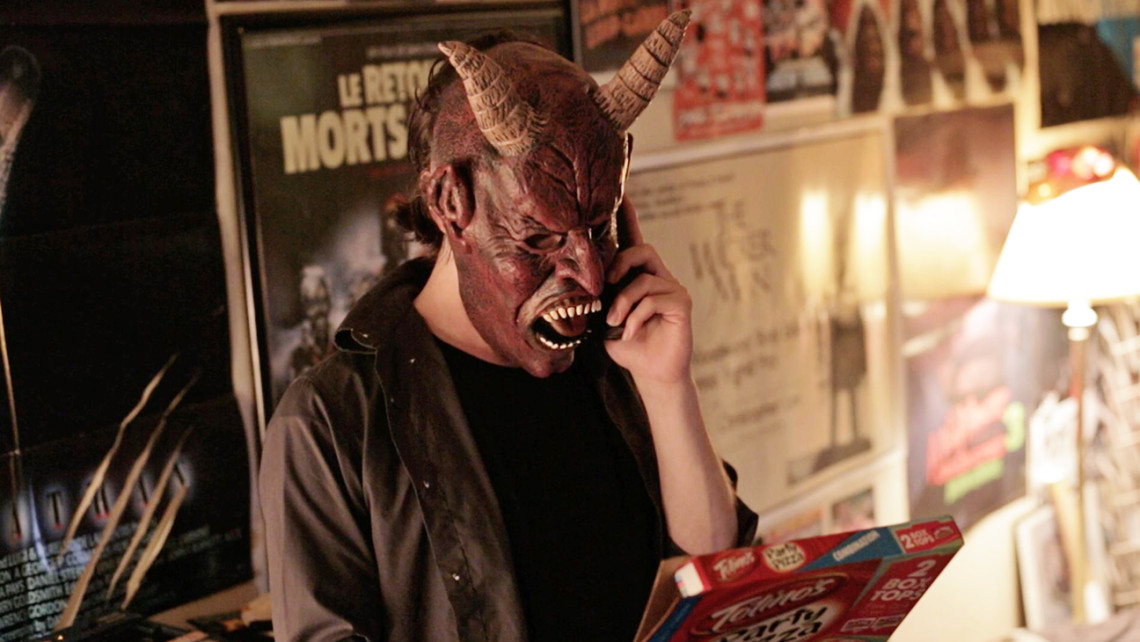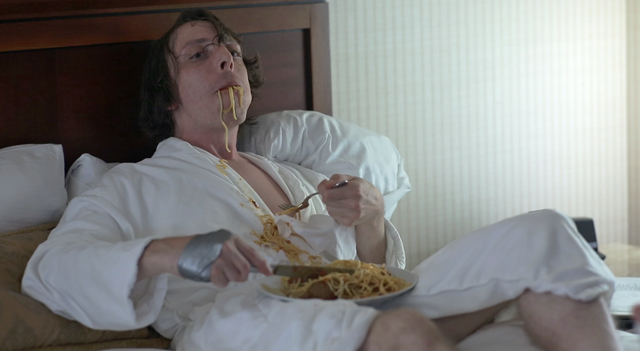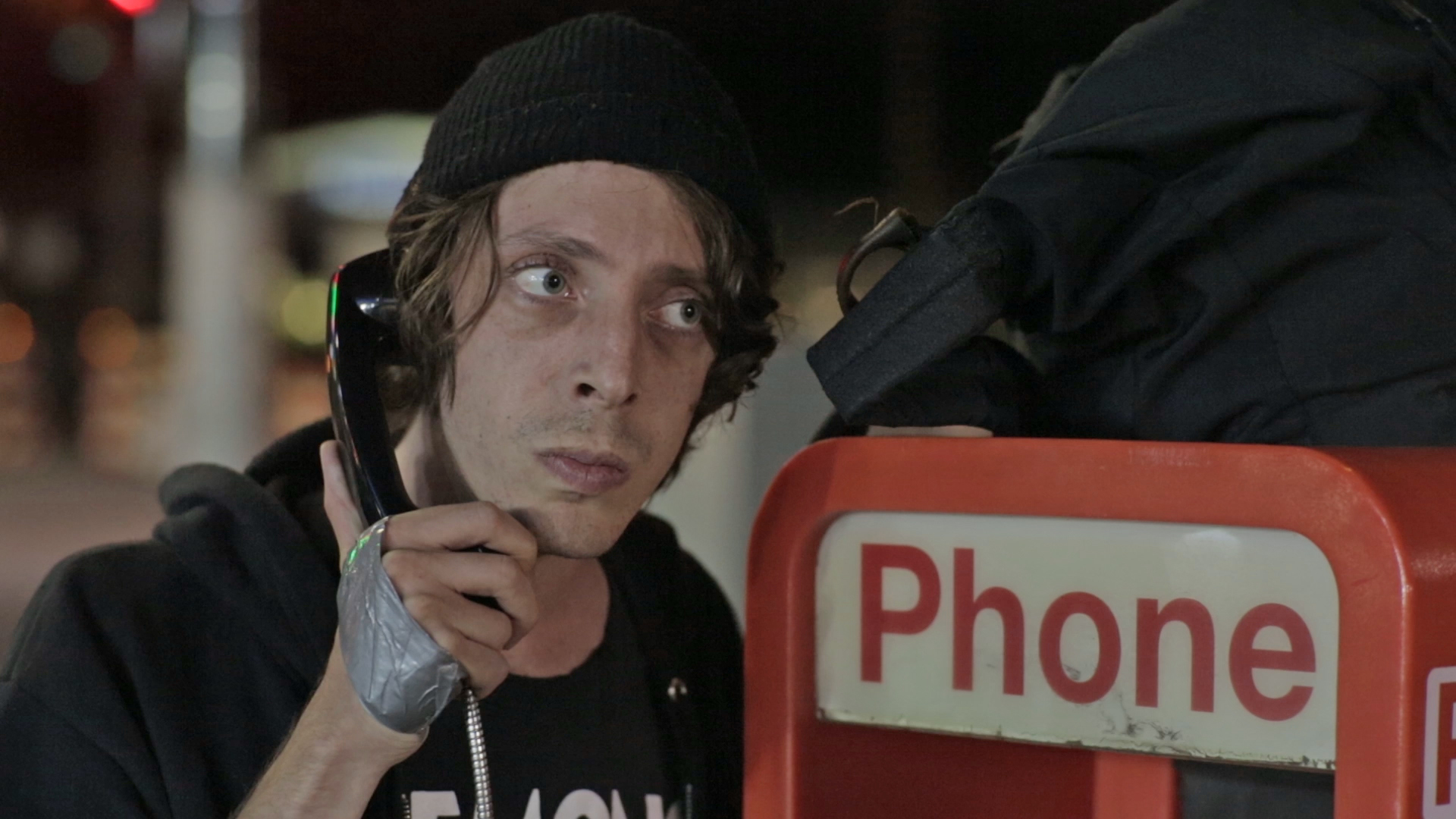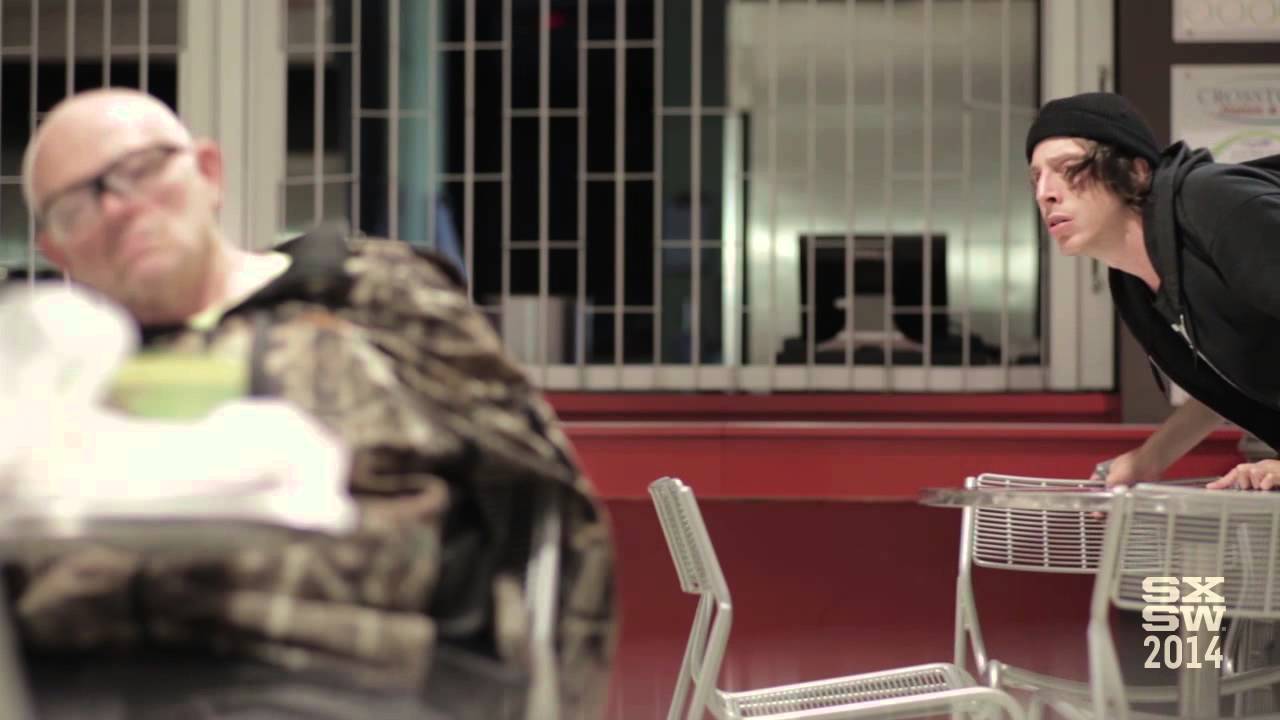The world doesn’t know director Joel Potrykus yet, but they’re about to. Alongside his muse, Joshua Burge, the director has quietly paid his dues on the indie scene in the last few years. With his second feature, Buzzard, a near-unclassifiable American indie that hopscotches genre with gleeful abandon, Potrykus has officially arrived, signifying a fresh, thrilling voice that those who are interested in hearing it won’t soon forget. We talked to Potrykus about his influences, his desire to consistently surprise the audience, and spaghetti.
Movie Messanine: Buzzard is the third film in your “animal trilogy,” as you’ve called it. Were these always the three stories you wanted to tell in succession?
Joel Potrykus: Well, not exactly. Coyote [his short from 2010] just kind of happened on its own, and then once I started writing Ape (2012) and decided, yeah, it needs to be called Ape, we all kind of sat around and [decided] we need to do make this an official trilogy. So the trilogy idea didn’t start to happen until we were writing Ape, and I didn’t want to make something where if someone didn’t see Ape, they wouldn’t understand Buzzard. I feel like I told less of a story in the trilogy but more of an emotion, an idea, a feeling. It’s more just kind of a study on…I wouldn’t want to say politics, but a study on human nature from my perspective.
I’m fascinated by your collaboration with actor Joshua Burge. He’s in essentially every scene of your films, and has such a magnetic, unpredictable presence. What is it about him that you find interesting and essential?
He’s not traditionally a trained actor, and the fact that he started off as a musician…I wanted to cast more of a performer than someone who was trained to say lines. He’s got, to me at least, a presence that you’re just born with, a look [in which] the camera just sits on his face for most of these movies and that’s the reason I feel you could just watch him do anything, and you’re going to pick up something from there: It’s…going fill you in on his character just by watching him say nothing.…[T]hat’s a rare thing to happen in any actor: an ability to hold the screen, have this presence without saying a single word. So that’s absolutely by design that the camera is with him at all times. That’s part of what I’m trying to do: tell a story through one person’s perspective. We never see what happens when Marty leaves the scene or before Marty gets there, so it’s almost like an unreliable narrator: He is where we’re perceiving everything through, and sometimes you’ll question what’s real or what’s not real because it’s coming through the eyes of this very angry young guy. And he’s just got the eyes and the presence to kind of tell these stories the exact way I hope to tell them.
How much freedom is Joshua given to carve out his own space to improvise in your films?
The reason I don’t write for him or for anyone specifically is that I don’t want to make a character that feels to me just like a person I know. I don’t think there’s anything interesting in that. I’m trying to create a character, so, for me, he’s always obviously in the back of my mind, but I never want to write with his voice. I want to challenge him and see what he can do new. For Buzzard, we rehearsed for eight months, and so the script that I had at the beginning of that rehearsal period obviously changed quite a bit by the end. It’s during those rehearsal periods when we improvise, goof around, shift things around and play with the scenes. After every rehearsal session, I’d go back and kind of write scenes based on how we just acted it out. And also by the time we get on set to shoot, we’re so comfortable with it that we’re able to throw in little jokes and extra lines. For me, all I was trying to do when we’re shooting is to make Josh laugh because he’s so in character. I may change up little lines here and there to see if I can catch him off guard, but again, we rehearse so much that we are those characters.
The beauty of Buzzard lies in your constant refusal to judge or condemn Marty for his actions. He’s unlikable on paper but he’s undeniably human. It’s hard not to root for him.
I would never, ever want to be a filmmaker that’s mocking characters that I’ve written. I don’t expect the audience to like them or hate them or cheer them. I just want them to understand the character, and I feel like mocking these characters then there would be no empathy. Once there’s no empathy…I don’t know what the point is. I understand Marty and I understand the character. I almost feel like they’re kind of my light side and my dark side, amplified voices of what I feel: Some anger I feel or a lot of my nerdy interests are put into those characters, and so it comes from basically me understanding them and really knowing where they’re coming from. People think [Marty is] a real asshole and that’s fine. You can totally see that. Some people see him as some kind of an antihero. All this stuff I never think about when I’m writing the movie. Once you start worrying or questioning yourself or wondering how people will react, then you’re making a movie for somebody else. First and foremost, you have to make a movie for yourself and hopefully people will at least just understand it.
Talk to me about your hometown of Grand Rapids, Mich. Other than it being an ideal place to shoot in terms of maintaining shoestring budgets, it provides the viewer with a look at this Midwestern wasteland that most films wouldn’t care about.
Honestly, I never once thought about that until Ape was shown at Locarno and people were like, “Oh, the Midwest is like some desolate wasteland. We had no idea.” And you know, I had no idea. It’s where we live, we work, and that’s just what is life to me. So when I’m writing, I’m never writing a scene with a bodega, because we don’t have bodegas. I’m not writing anything with a subway, because we don’t have that. I’m just writing what I know, and when people to react to this grimy urban landscape, that’s just where we come from. We’re never trying to exploit our surroundings. When we shot in Detroit, we were intentionally trying to stay away from this, like, ruin porn that so many filmmakers, when they come into Detroit, see all the abandoned buildings and crumbling streets and they shoot all these establishing shots and it’s poverty—that doesn’t feel like my world to me; that feels like someone who’s seeing it for the first time and is out to surprise everybody. We’re never trying to put that on display of how impoverished Michigan can be. If it’s going to be in there, it’s going to be in there for an actual reason to help tell the story.
You seem content to play in your own sandbox with your minimalist lo-fi aesthetic and your small crews. Do you ever picture a time in the future when this could change?
As much of a man of integrity that I feel like I am, I would also absolutely take a hefty paycheck for shooting it somewhere else. That’s one thing about shooting these low-budget films in Michigan: Sure, we have a lot of freedom and we can tell our stripped-down stories how we want to, but it’s also very difficult to make a living making these small films. Like I said, I’m not ever consciously thinking I want to make a small film; it’s just the story that I’m interested in. I’m never going to make a science-fiction epic or anything like that…I think if I were to make something bigger or more expensive, I think that would involve the same type of story and [minimalist style], but I think that’d give me the ability to literally destroy things. I have a script where I want to basically destroy the inside of an office building, but that kind of thing costs money, and you have to get insurance…I would definitely love to start shooting bigger things but trying to maintain the same size mainly so that I can pay everybody a little bit better than we pay now, and we can make a better living off doing these things. So yeah, I’ll sell out, no problem. Just give me the paycheck.
The shifting of tone is so organic and natural in your films. How important is it for you to constantly be surprising the audience?
Yeah, that’s my main goal: I’m trying to lull people to sleep and knock ’em on the head with something. It’s weird to classify because Buzzard’s being called a dark comedy, and I don’t know if that quite fits because there are different ways to do it. I mean, you watch The Evil Dead and there’s blood splattering at people’s eyes and eyeballs shooting at the mouth, so at the same time it’s funny and violent and gory, [all] in the same shot even. But for me, I like to mix tones in a different way: I like my funny to stay on one side, and my violent to stay on the other, and not mix them together because it takes the impact out if you’re making a violent scene funny or if you’re [adding violence to] a funny scene, [because] it’s going to be slapstick-y. I like to absolutely mix tones just because the world we live in is not a comedy and it’s not a horror film; it’s got a little of everything. I’m just trying to capture the real world as I see it, and exaggerate it and amplify it a little bit. “Was that a comedy? Was that a drama?” That stuff’s all silly labels. We just gotta start getting over these stupid labels and just make the movies.
For me, the film’s key scene arrives when Marty is hustled by the cashier at the gas station when Marty says to the guy, “Don’t rip me off, I’m just a regular guy.” It’s a simple line, but it reverberated with me.
That’s really important because the movie sets Marty up as someone who’s just an asshole who’s going to con and steal from everybody, but that’s the scene where we realize he does have his own skewed sense of ethics and integrity: He’s upset at this guy because he’s violating the rule, man. “We’re supposed to be stealing from the big guys, [so] why are you stealing from me?” He’s conflicted, and it’s not so much to point the finger at Marty and be like, “Haha, now you get a taste of your own medicine.” It gives us a sense of where he’s coming from and that he isn’t necessarily a bad guy. He’s really just doing what he thinks is right.
There’s a hilarious gag in the movie of your character being fed Bugles on a treadmill. How did that find its way into the film?
I don’t even know, man. We turned one of our producers’ parents’ basement into “the party zone,” so we went down there with a bunch of posters and crazy décor to transform it, and his mom happened to have a treadmill in the basement. So it was like, “oh, we could do some funny stuff with this.” I even brought over rollerblades; I thought that’d be a funny scene to watch Derek on a treadmill with rollerblades, but it turns out it’s the most boring thing because you just don’t move. You just stand perfectly still. For whatever reason, I was like, “Let’s put some food on this treadmill and have somebody eat it.” I have no idea, man. I just did it as Derek and Josh was so grossed out by watching me cough and gag that he’s like, “I don’t want to do that.” I was like, “All right, I guess it’s gonna be Derek in the movie eat the Bugles.” So yeah, sometimes you just can’t script greatness.
You’ve said in an interview before that Buzzard has the feel and movement of Kelly Reichardt’s Wendy and Lucy, another modest indie about a character who’s just barely scraping by. What filmmakers inform your work the most?
That was a movie that I always make everybody who’s going to work on these movies watch. Just watch Wendy and Lucy, watch how it breathes. It’s not pushing a plot; it’s just so natural. I watched that one around the same time I watched Chop Shop by Ramin Bahrani, and just the way those were…that sense of realism. I still am big into Italian neo-realism, [but] I feel the new American realism strips away some of the melodrama, and it really hit something because before that, I was still trying to emulate Sam Raimi. Raimi is a Michigan filmmaker, and he was the guy that first made me feel I could be a filmmaker. You can do things in the woods with your friends and have them seen by the world. But then once I got into college, I discovered Jim Jarmusch and Down by Law and Stranger Than Paradise. Those were two influences early on. As I got a little bit older…obviously, I steal a lot from Taxi Driver, always. Michael Haneke’s stuff, actually…and Yorgos Lanthimos, who did Dogtooth. My gosh. What he was able to do in that movie is pretty mind-blowing. I don’t know if you’ve seen some of the earlier stuff by Lindsay Anderson, the British filmmaker who had his own trilogy starring Malcolm McDowell. He made the film O Lucky Man! That was just such a big moment for me when I saw that. I just couldn’t believe how he able to shift stories and do whatever he wanted. It felt totally like a film with no rules. Something I’m writing right now is very much taken directly from O Lucky Man!
My influences are all over the place. I think I tend to appreciate a lot of things that people probably wouldn’t expect, but as far as direct influences, it’s the realist filmmakers. I’m trying to take their sense of realism and inject it with a little amplified realism or the extreme. When you’re setting this world that feels very real and this guy has this Freddy Krueger glove made out of a power glove, it feels almost a little surreal.
In the pantheon of movie spaghetti-eating scenes, you easily knock Harmony Korine’s Gummo off the throne. It’s this rare moment of happiness for Marty. Was that all done in one take?
That’s another really important scene, which is originally lifted from A Clockwork Orange when towards the end, [Alex is] all cleaned up and he’s taking a shower and wearing a robe and eating spaghetti. He’s happy like he’s at home, right before they poison his wine. That scene is really important because that’s Marty in a foreign environment, the only time we see him clean, and he’s wearing white instead of black, and he’s eating essentially real food as opposed to, you know, Hot Pockets or Bugles.
The backstory was, the producer brought one plate of spaghetti. The script said, “Marty eats the best plate of spaghetti he’s ever had.” I told Josh, “Just take a couple bites, smile, be happy, and I’ll say cut.” And I didn’t anticipate that he was going to start shoveling it in like that and make a complete pig of himself, which encapsulates what I was trying to do way better than “just have a couple bites.” I could not have written this one. That’s all Joshua. He did that right after he had a full meal. It took about six minutes of me standing there watching.
The tagline for your next film is “Walden Pond with a monster.” Can you shed a little light on what we can expect?
I’m wiping the slate clean from the “animal trilogy.” We’re stepping out of the Midwest urban decay and we’re going into the swamps. We’re taking out The Man and we’re inserting black magic. I don’t see any similarities in it to what I’ve done before, but I’m sure other people will see that. Again, it’s really an examination of one person and one character, so in that sense it’ll be similar to what I’ve done before. This is going to be something different and I’m hopefully mixing genres to an even higher extreme on this one. I’m excited.





















One thought on “No Heroes, No Villains: An Interview with Joel Potrykus of “Buzzard””
Pingback: Interview: Joel Potrykus (Buzzard) | serene cinema